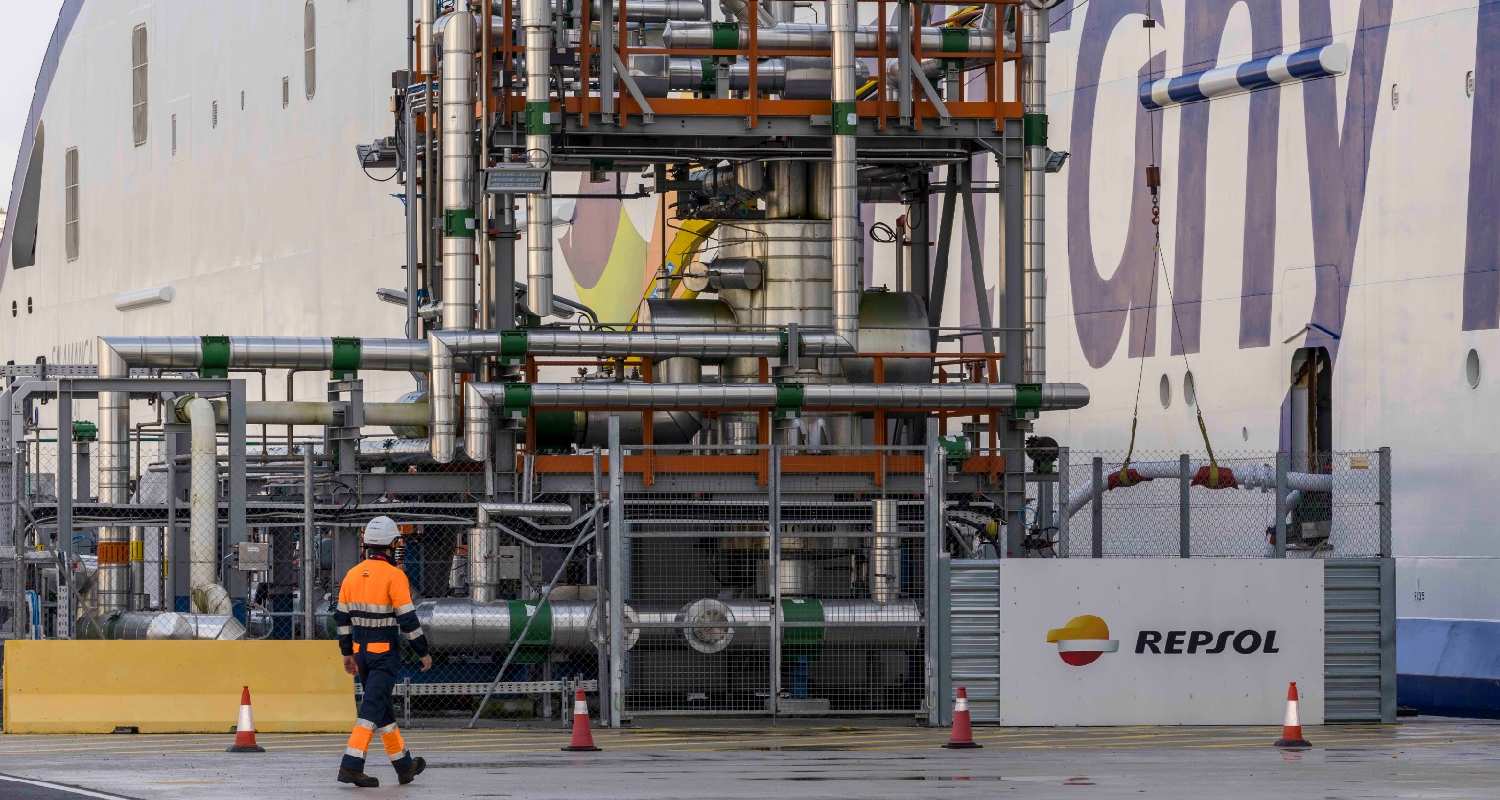Repsol supplies bio-LNG to Brittany Ferries for the first time in Spain
- This is the first test of its kind for the two companies, consisting of the supply of three truck-loads, totalling 60 tons of bio-LNG to be used in Brittany Ferries LNG-fuelled vessels. It is the first supply of its kind in Spain.
- The collaboration between Repsol and Brittany Ferries highlights the firm commitment of both companies to the use of renewable fuels and the decarbonization of maritime transport.
Repsol has started supplying liquefied biomethane (bio-LNG) to Brittany Ferries’ LNG-fuelled vessels Salamanca and Santoña at the LNG-bunkering terminal in Santander (Spain). This is the first test of its kind for the two companies, consisting of the supply three truck-loads, totalling 60 tons of bio-LNG, and it is the first supply of its kind in Spain.
The collaboration between Repsol and Brittany Ferries highlights the firm commitment of both companies to the use of renewable fuels and the decarbonization of maritime transport.
The use of bioLNG can reduce the emissions of CO2 equivalent over 100% compared to the use of conventional LNG, depending on the feedstock to produce the biomethane. Additionally, the use of bioLNG in the ferries does not require any changes to the engines and allows for the same performance of the vessels, as the bioLNG has the same chemical composition as conventional LNG.
The fuel is produced at the first bioLNG facility in Spain located in As Somozas, in the northern Spanish region of Galicia. It is a produced from waste from the agri-food industry, agriculture, and households, as well as sewage plant sludge.
“This test is the next significant step on Brittany Ferries journey to a more sustainable future,” explained Bertrand Crispils, Head of Energy Transition, Brittany Ferries. “The first three truck-loads of bio-LNG are the starting gun for Brittany Ferries to progressively substitute fossil fuels with greener alternatives. Combining the use of biofuels with other measures, such as electrification and efficient hydro-dynamics, means we can fully mobilise in the battle to cut greenhouse gas emissions."
Carlos Martin Iglesias, LNG Bunker trader at Repsol said, "With these first supplies of bioLNG, we provide another option for the maritime sector to reduce the CO2 emissions from its activities. This trial is another proof of the commitment of Repsol to the energy transition and to supplying different energy alternatives to help its customers advance in their decarbonization processes."
This first supply of bioLNG follows significant investments that Brittany Ferries has made to have a more sustainable fleet of ships. Between 2020 and 2025, five new vessels will be joining the fleet, four of which will be powered by LNG. This includes two vessels already serving long-haul routes and two LNG-electric hybrids that are expected to arrive at the end of this year. Currently under construction, the hybrids will be ready for commercial services in the spring of 2025.
Renewable fuels are one of the key levers in Repsol's decarbonization strategy, as a complementary solution to electrification and renewable hydrogen that allows for immediate emissions reductions from all sectors of transport. Repsol aims to reach a total production capacity of renewable fuels, including biomethane and renewable hydrogen, of between 1.5 and 1.7 million tons in 2027 and up to 2.7 million in 2030, and to lead the market for this type of fuel for all sectors of transport in the Iberian Peninsula. With the start-up earlier this year of its new advanced biofuels plant in Cartagena, with an annual production capacity of 250,000 tons, the company is at the forefront of the industry in terms of renewable fuels production.

About Repsol
Repsol is a global multi-energy company that can meet all the energy needs of customers both at home and on mobility. It employs 25,000 people in more than twenty countries and reaches twenty-four million customers.
Its extensive network of 4,500 service stations across Spain, Portugal, Peru and Mexico supplies fuels and is also incorporating alternatives such as 100% renewable fuels, electric recharge, AutoGas, and natural gas for vehicles. In addition, it is the fourth-largest electricity retailer in Spain, with more than 2.3 million customers, and is building a diversified renewable generation portfolio, with an installed capacity of 3,100 MW, mainly in Spain, the United States and Chile.
Producing an average of 589,000 barrels of oil per day, Repsol boasts one of Europe's most efficient refining systems. Repsol is transforming its six industrial complexes in the Iberian Peninsula into multi-energy hubs, capable of turning a wide variety of raw materials and waste into products with a low carbon footprint such as 100% renewable fuels, which will be key to achieving its goal of reaching net zero emissions by 2050.
About Brittany Ferries
The French shipping company has been sailing from the Cantabrian capital, Santander, for more than 40 years. Founded in Brittany, France, in the 1970's as a result of the union and effort of Breton farmers who, led by Alexis Gourvennec, created it with the aim of taking their products beyond their borders. Thus, on January 2, 1973, just one day after the United Kingdom joined the European Economic Community, Brittany Ferries made its inaugural crossing from Roscoff (France) to Plymouth (England) with a ship loaded with artichokes and cauliflowers.
Five decades later, Brittany Ferries is still mainly owned by agricultural cooperatives in northwest France and its business model has not changed. It is a company based on a culture that reflects the values and traditions of the regions it serves and has adapted to the times with a greener future. Since March 2022, new LNG-powered vessels have joined the fleet. The Salamanca and the Santoña, which already operate from Spain, will be joined by two more in the coming years. These ships, in addition to being more efficient and environmentally friendly, have nothing to envy to a cruise ship for its amenities and award-winning services. Brittany Ferries currently connects ports in Spain, United Kingdom, Ireland, and France.
